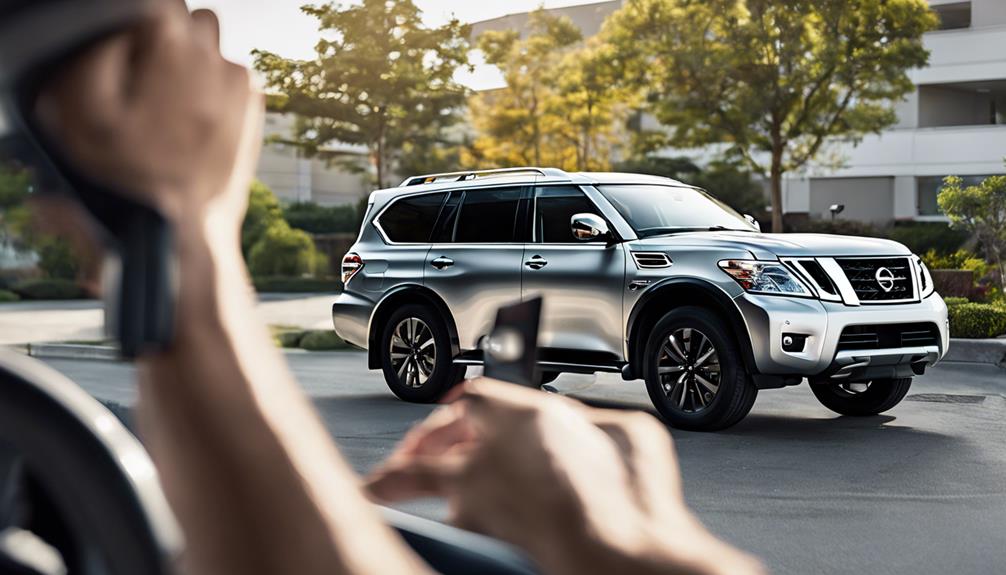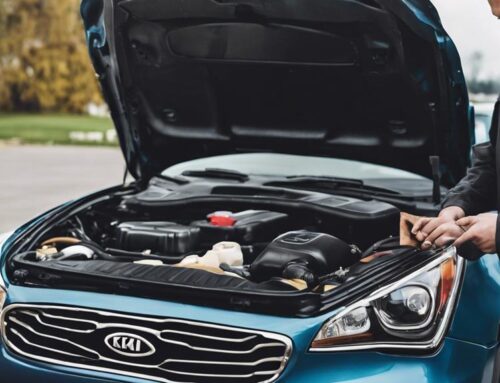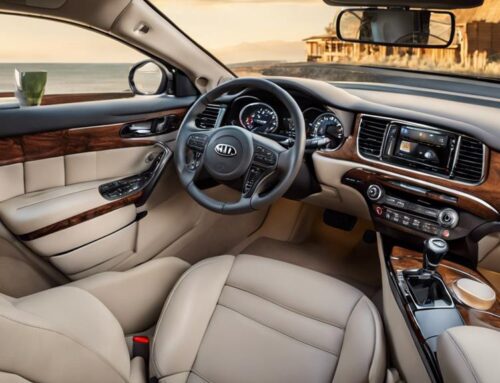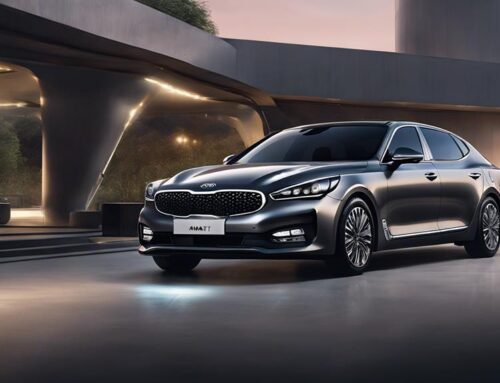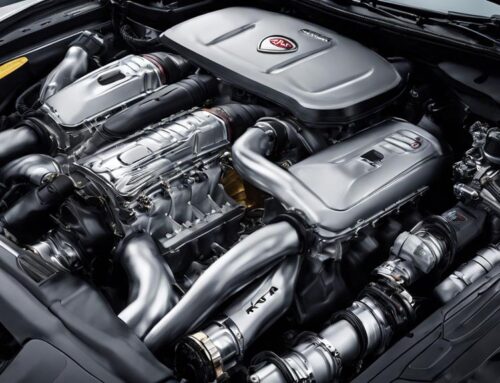For your Nissan Armada, common key system issues include key detection failures, signal interference, and battery malfunctions. Key detection problems arise from improper synchronization and key fob failure, necessitating professional reprogramming. Signal interference from electronic devices can hinder the key fob's range. Battery issues manifest as decreased range or intermittent operation, requiring precise checks and replacements. Stubborn ignition, immobilizer troubles, and remote start malfunctions further complicate the system. Ensuring meticulous maintenance and troubleshooting can preempt these issues. Continue exploring to uncover professional advice and DIY fixes to keep your key system operable.
Key Takeaways
- Key fob failures often require precise programming for synchronization and may need professional handling.
- Signal interference from electronic devices and environmental obstacles can disrupt key fob functionality.
- Battery failures in key fobs show signs like decreased range or intermittent operation, requiring careful replacement.
- Immobilizer system issues can prevent vehicle start, often needing key programming or ignition reprogramming.
- Mechanical or electrical problems can cause the key to get stuck in the ignition, necessitating inspection and possible key replacement.
Key Detection Issues
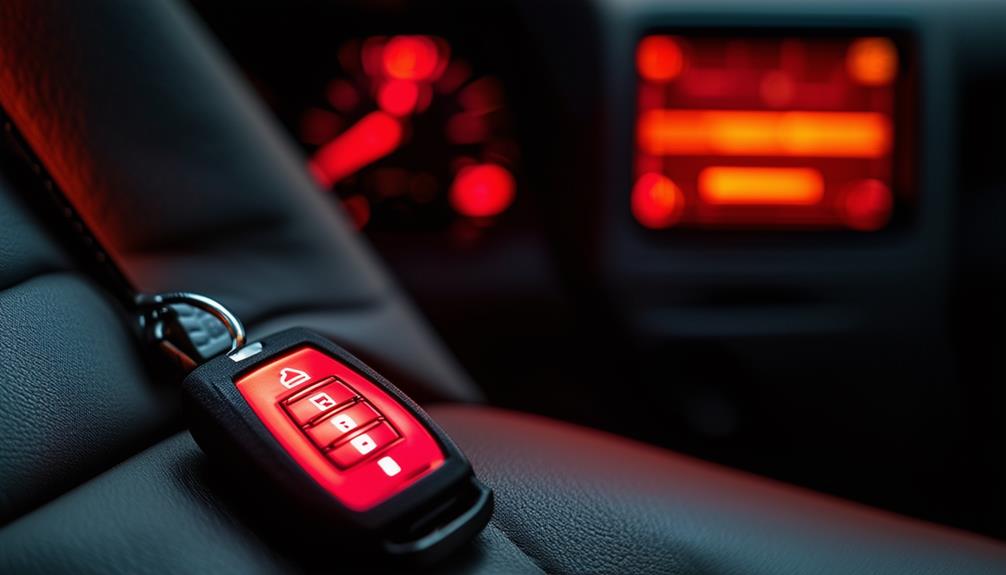
Key detection challenges can pose a significant issue for Nissan Armada owners, often leading to annoyance and inconvenience. When your vehicle's key fob fails to communicate effectively with the vehicle's onboard systems, it can hinder you from accessing or starting your car. Understanding the complexities of these challenges can help you discover efficient solutions.
One common cause is the failure of the key fob itself. Over time, the internal circuitry of the key may deteriorate, necessitating a key replacement. Modern key fobs are advanced devices that require precise programming to synchronize with your Nissan Armada's security system. When obtaining a key replacement, ensure it's handled by a professional who can offer accurate programming solutions. This ensures the new key fob will smoothly integrate with your vehicle's existing system. For more details, you can explore step-by-step instructions on how to program your key fob.
Another crucial aspect to ponder is the role of your vehicle's keyless entry system. The system depends on a network of sensors and transponders to detect the presence of the key fob. If any component within this network is malfunctioning, it can lead to key detection challenges. Addressing these necessitates a systematic diagnostic approach, often involving specialized equipment to pinpoint the faulty component.
Innovative programming solutions can also provide enhanced functionality. For instance, some advanced programming services allow for the customization of key fob features, such as remote start or personalized entry settings. Embracing these solutions not only resolves detection challenges but also enhances your vehicle's convenience features.
Signal Interference
Signal interference can greatly affect the functionality of your Nissan Armada's key fob, potentially preventing seamless communication with the vehicle's onboard systems. Advanced key fobs rely on a stable signal range to engage with the car's locking mechanisms, ignition, and other electronic systems. When interference occurs, it disrupts this communication, leading to inconvenient and sometimes frustrating experiences.
Understanding the sources of signal interference is essential. Common culprits include electronic devices such as mobile phones, Wi-Fi routers, and even other car key fobs. Environmental factors like thick walls and metal objects can also diminish signal strength, further complicating the issue.
To effectively tackle interference troubleshooting, you need to identify these disruptive elements and either eliminate or minimize their impact. Here's a concise table to help you understand the potential sources and solutions:
| Source of Interference | Recommended Action |
|---|---|
| Electronic Devices | Keep key fob away from other devices |
| Environmental Obstacles | Remove barriers or relocate vehicle |
| Other Car Key Fobs | Isolate your key fob from others |
Your signal range may also be influenced by the key fob's internal components. Corrosion, physical damage, or even software glitches can contribute to diminished performance. Conducting a systematic check of the key fob and its surroundings can help diagnose the problem.
Lastly, consider leveraging innovative interference troubleshooting tools and techniques. Signal amplifiers and shielding materials can enhance signal strength and reduce interference. Staying informed about the latest advancements in automotive key technology can provide you with the edge needed to maintain the best performance of your Nissan Armada's key system.
Battery Failures
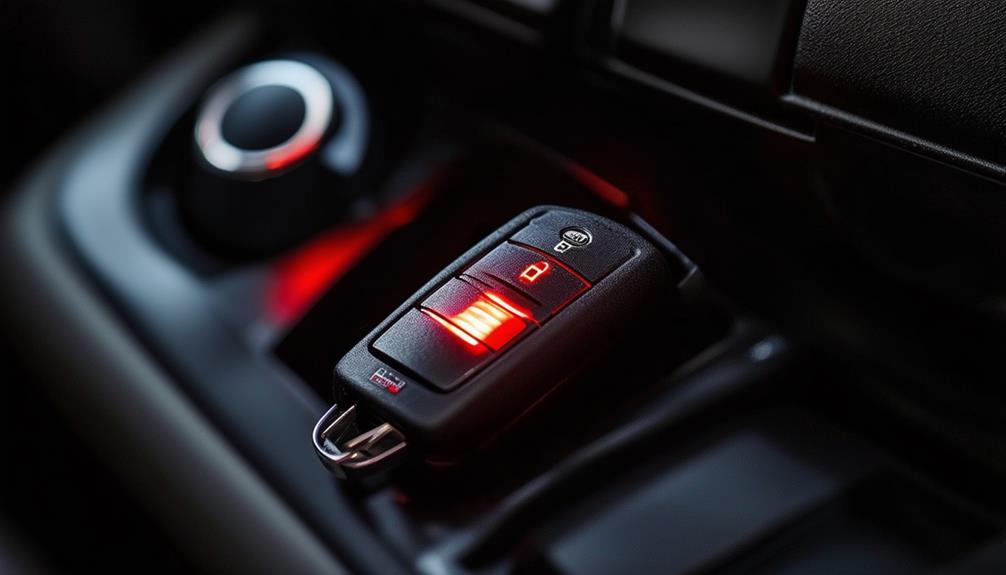
One of the most common issues affecting the Nissan Armada's key system is battery failure. When the battery in your key fob starts to lose its charge, you might notice a decrease in the range at which your key fob operates or find that it intermittently stops working altogether. This issue can often be resolved by performing a battery replacement, which is a straightforward process but requires some technical finesse.
First, you'll need to locate the small compartment on the key fob that houses the battery. Using a fine-tipped tool, carefully pry open this compartment. It's crucial to make sure you're using the correct type of battery, usually a CR2025 or CR2032, as specified in your owner's manual.
After replacing the battery, you should conduct key fob programming to re-sync the fob with your vehicle's system. This guarantees that the new battery is recognized and the fob functions correctly. If you're experiencing additional malfunctions, you might find that professional help is necessary for key fob-related issues.
Troubleshooting battery issues involves a few steps. If your key fob still doesn't work after the battery replacement, check for any corrosion on the battery contacts and clean them if necessary. Additionally, verify that the new battery is installed with the correct polarity. If the problem persists, the issue might be more complex than a simple battery failure, possibly requiring professional diagnostics.
For those looking for innovative solutions, some advanced key fobs come with rechargeable batteries and can be charged via USB. While these options might offer more convenience, you'll still need to follow proper key fob programming and troubleshooting practices to ensure peak performance. By staying vigilant, you can minimize disruptions and enhance your Armada's reliability.
Key Not Turning in Ignition
While battery failures are a common annoyance, another frequent issue Nissan Armada owners encounter is the key not turning in the ignition. This problem can be perplexing, especially when you're in a rush. Understanding the underlying causes can help you address the issue efficiently and prevent future occurrences.
First, consider the ignition switch. Over time, wear and tear can cause the internal components of the ignition switch to malfunction. If the switch is worn out, it may not properly align with the key. This misalignment prevents the key from turning, rendering your vehicle inoperable. To resolve this, you might need to replace the ignition switch or have it inspected by a professional technician.
Additionally, issues with the immobilizer system may also contribute to ignition problems, as it's designed to prevent unauthorized vehicle starts.
Another common culprit is the steering lock mechanism. The steering lock is designed to prevent the steering wheel from turning without the key in the ignition. If the steering wheel is turned too far to one side, the lock can engage, making it difficult to turn the key. To release the lock, gently turn the steering wheel back and forth while trying to turn the key. This often realigns the lock and allows the key to turn freely.
Additionally, debris or foreign objects within the keyhole can obstruct the key's movement. Regularly clean the ignition key and keyhole to prevent buildup. Use a specialized lubricant designed for locks to keep the mechanism functioning smoothly.
Lastly, verify your key isn't damaged or worn out. A bent or worn key may not engage the ignition switch correctly. If this is the case, consider getting a new key cut from the original or a professional locksmith.
Remote Start Malfunctions
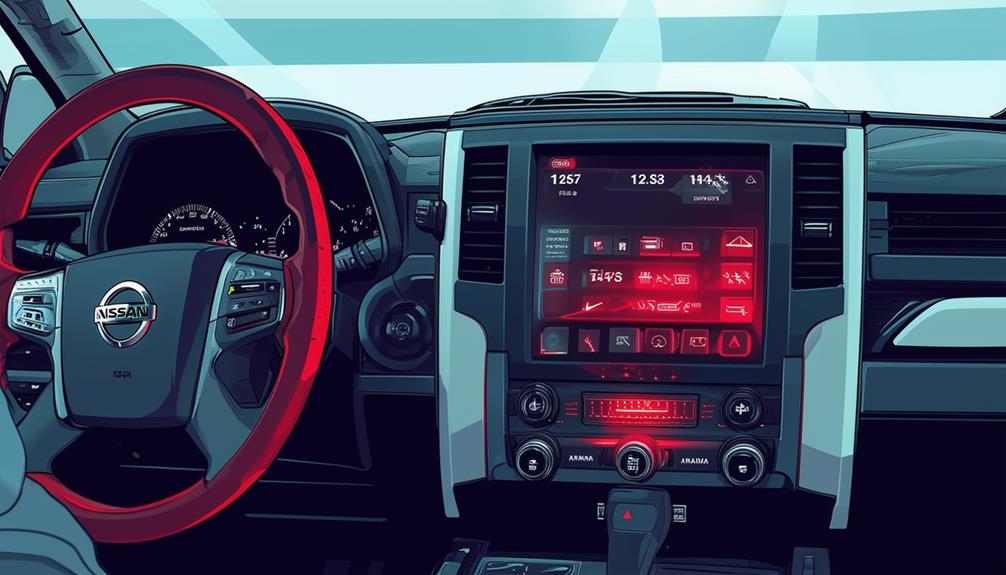
Why do remote start malfunctions happen so frequently with the Nissan Armada? The complexity of modern automotive electronics, combined with the sophisticated keyless entry systems, often makes the remote start feature susceptible to a range of issues. Understanding the underlying causes can help you address them more effectively.
Firstly, interference from other electronic devices is a common culprit. Your Nissan Armada's remote start system relies on a specific frequency to communicate with the vehicle. If other devices in close proximity emit similar frequencies, this can cause signal disruption, leading to malfunction. One of the primary troubleshooting tips is to make sure you're operating the remote start away from potential electronic interference.
Regularly sustaining the lock and key systems can also help reduce the likelihood of these issues.
Battery issues are another frequent cause. Both the vehicle's battery and the key fob's battery need to be in prime condition for the remote start to function correctly. Low voltage can impede the system's ability to start the engine remotely. Regularly check and replace the key fob battery as a preventive measure.
Software glitches can also lead to remote start malfunctions. Sometimes, the vehicle's onboard computer might need a reset to clear any temporary faults. Disconnecting the battery for a few minutes can effectively reset the system, resolving minor software issues.
For those seeking professional solutions, consulting a certified Nissan technician is recommended. They can perform a detailed diagnostic using specialized equipment to pinpoint and rectify the problem. Additionally, they can update the vehicle's software, ensuring it runs the latest firmware to minimize future issues.
Key Fob Signal Loss
Experiencing key fob signal loss with your Nissan Armada can be frustrating, but understanding the technical aspects can aid in troubleshooting the issue. One primary factor to ponder is the signal range limitations inherent in key fobs. Typically, your key fob should function within a specific distance from the vehicle, generally around 30-60 feet. Anything beyond this range can lead to signal loss. For more details on key replacements, including transponder and smart keys, visit the Complete Guide.
To address this, start by narrowing down the range. Stand closer to your Armada and attempt to lock or open the doors. If the fob works at close range but not at a distance, it's likely a signal range limitation rather than a hardware defect. Environmental factors such as physical obstructions or electronic interference can also play a role. Buildings, dense foliage, and other vehicles can disrupt the signal.
For effective troubleshooting techniques, first, replace the key fob batteries. A weak battery can greatly reduce the signal strength. Use the correct battery type, usually a CR2025 or CR2032, depending on your model year. After replacing the battery, reprogram the key fob if necessary. Consult your owner's manual for specific instructions.
Additionally, inspect the key fob for physical damage. Any cracks, water damage, or broken buttons can interfere with signal transmission. If the fob appears damaged, you might need a replacement or professional repair.
Lastly, contemplate software updates. Your Nissan Armada's onboard computer may require periodic updates to maintain peak functionality, including key fob communication. Visit your dealership to ensure your software is up-to-date.
Immobilizer Problems
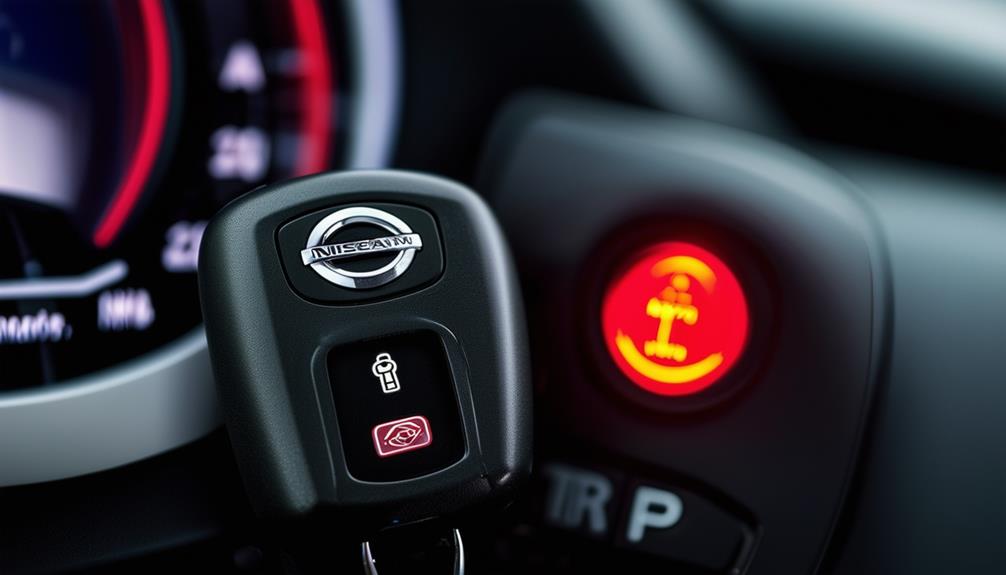
Immobilizer problems in your Nissan Armada can be particularly vexing, often leading to an inability to start your vehicle despite having a functional key fob. When the immobilizer system fails to recognize the signal from your key, you're left stranded with a vehicle that simply won't budge. This issue typically stems from a malfunctioning transponder chip within the key fob or faults in the immobilizer control unit itself.
For more detailed information about the Nissan Armada's immobilizer system, including its functions and maintenance, visit Nissan Armada Immobilizer System.
To address these immobilizer issues, an immobilizer bypass can be a short-term solution. This involves temporarily disabling the immobilizer function, allowing you to start the vehicle. However, this isn't a permanent fix and should be used sparingly.
For a more durable solution, key programming becomes essential. Reprogramming the key guarantees that the transponder chip and the immobilizer system are synchronized, allowing seamless communication between the two.
In more severe cases, ignition reprogramming might be necessary. This process involves resetting the vehicle's ignition system to recognize new or existing keys, effectively resolving any miscommunication between the key and the immobilizer. This can be a complex procedure, often requiring specialized diagnostic tools and technical expertise.
If your transponder chip is damaged beyond repair, a transponder replacement is inevitable. This involves installing a new transponder chip into your key fob and verifying it's correctly programmed to match your vehicle's immobilizer system. While this can be more costly, it provides a long-lasting solution to immobilizer problems.
Stuck Key Problems
When your Nissan Armada's key gets stuck in the ignition, it's more than just a minor inconvenience—it can indicate underlying mechanical or electrical issues. Typically, a stuck key might suggest problems with the ignition cylinder, shifter mechanism, or even the steering lock. Identifying the root cause is essential for preventing further complications and guaranteeing your vehicle's reliability.
First, inspect the ignition cylinder. Debris or wear and tear can cause the key to jam. If you try to forcefully remove the key, you might end up causing more damage. Instead, consider seeking professional locksmith assistance for key extraction. A skilled locksmith can safely remove the key and diagnose the cylinder's condition, potentially saving you from a costlier repair down the line.
Next, evaluate the shifter mechanism. Sometimes, the vehicle must be in the 'Park' position to release the key. If the shifter isn't fully engaged, it can lock the key in place. Verify your Armada is correctly shifted before assuming a more complex issue.
Moreover, don't overlook the steering lock system. If the steering wheel is turned too far in either direction, it can activate the lock, trapping the key. Carefully maneuvering the wheel while turning the key might resolve the issue.
In cases where the key is excessively worn or damaged, key replacement might be necessary. However, this isn't a simple swap. Modern keys require precise programming to match your vehicle's security system, and programming costs can add up. Consulting with a locksmith experienced in Nissan vehicles will guarantee the new key functions seamlessly with your Armada.
Addressing a stuck key promptly not only restores your vehicle's usability but also prevents further wear on essential components, ensuring your Nissan Armada remains innovative and efficient.
Key Fob Unresponsive
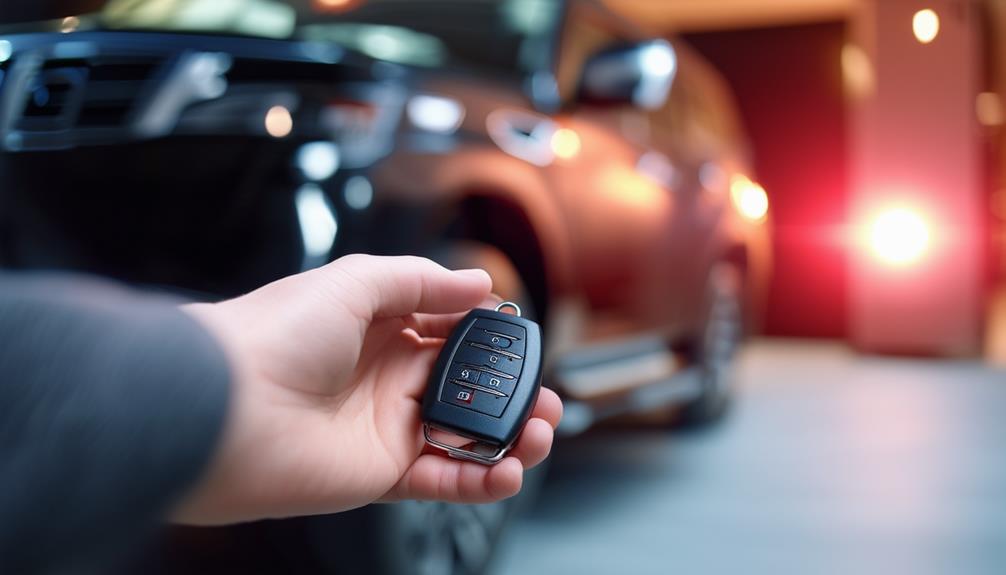
If your Nissan Armada's key fob becomes unresponsive, it can disrupt your daily routine and point to deeper electronic or battery issues. Understanding the intricacies behind an unresponsive key fob is essential for efficient troubleshooting and ensuring your vehicle remains operational.
First, let's explore possible causes. The most common issue is a depleted battery within the key fob. However, it could also be due to a malfunctioning internal circuit or signal interference. To troubleshoot, start by replacing the key fob battery. Use a small flathead screwdriver to access the fob and swap the old battery for a new CR2025 or CR2032, depending on your model.
Troubleshooting Tips
| Issue | Possible Cause | Solution |
|---|---|---|
| Key fob doesn't open | Depleted battery | Replace with CR2025 or CR2032 |
| Intermittent functionality | Signal interference | Move away from interfering devices |
| No response at all | Internal circuit failure | Contact a professional locksmith |
If replacing the battery doesn't resolve the issue, consider signal interference. Electronic devices, metal objects, or even other key fobs might be causing disruption. Moving away from potential sources of interference can sometimes restore functionality.
For persistent issues, the internal circuitry could be at fault. In such cases, professional assessment and repair are advisable. Contact a certified locksmith specializing in Nissan vehicles for a detailed diagnosis. They can provide you with replacement options if necessary, ensuring the new key fob is correctly programmed and fully operational.
DIY Fixes for Common Issues
Often, addressing common issues with your Nissan Armada's key system can be straightforward with some basic DIY fixes. One prevalent problem is a malfunctioning key fob. If your key fob is unresponsive, begin by replacing the battery. Use a small flat-head screwdriver to carefully open the fob and swap out the old battery for a new one. Confirm the battery is seated correctly to avoid connectivity issues. For added longevity, consider the key fob care suggestions, which include avoiding exposure to moisture and extreme temperatures.
Next, consider key programming. If your fob still doesn't work, it might need reprogramming. Insert your key into the ignition and turn it to the "ACC" position. Within five seconds, turn it back to the "OFF" position. Repeat this process six times, ending in "ACC." Your car's hazard lights should flash, indicating it's in programming mode. Press any button on the key fob within five seconds to synchronize it with your vehicle.
Moreover, lock maintenance is essential. Over time, debris and grime can accumulate in the locks, causing them to stick or malfunction. Use a silicone-based spray lubricant to clean and lubricate the lock cylinders. Insert the key and turn it several times to evenly distribute the lubricant. This simple step ensures smooth operation and prolongs the life of your locks.
Frequently Asked Questions
How Often Should I Replace My Nissan Armada Key Fob Battery?
You should replace your Nissan Armada key fob battery every 1-2 years. The key fob lifespan depends on usage, but timely battery replacement guarantees peak performance, preventing inconveniences and maintaining your vehicle's innovative security features.
Can Extreme Weather Affect My Nissan Armada's Key System?
Extreme weather can greatly affect your Nissan Armada's key system. You'll notice reduced performance, making it more challenging to access or start your vehicle. Take necessary precautions like shielding your key fob from harsh temperatures for best functionality.
What Should I Do if My Key Fob Gets Wet?
If your key fob gets wet, immediately address water damage by using drying techniques. Remove the battery, dry all components with a soft cloth, and use silica gel packets to absorb moisture. Reassemble once completely dry.
Are There Aftermarket Keys Available for the Nissan Armada?
Yes, 60% of Nissan Armada owners opt for aftermarket keys. You can get key programming and key duplication services, ensuring compatibility with your vehicle's security system. These services provide a cost-effective and innovative solution for key replacement.
How Can I Prevent Key Fob Damage?
To prevent key fob damage, focus on key fob maintenance by regularly checking the battery and avoiding exposure to water. Utilize key fob protection like a durable cover to shield it from drops and impact.
Conclusion
In understanding the key system quirks of your Nissan Armada, you might encounter a few hiccups like signal interference or battery glitches. But don't sweat it—most of these issues have straightforward fixes. Whether it's a stubborn key or an unresponsive fob, a little troubleshooting can often save the day. So next time your key's playing hard to get, remember, a quick DIY might just do the trick. Keep calm and carry on cruising!

